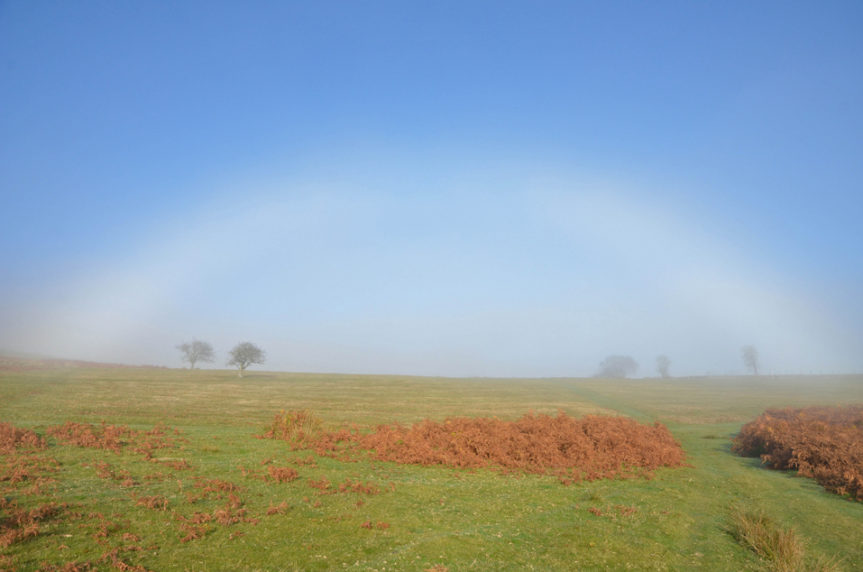Interview by Anne Fullerton Photograph by Maia Flore (From Kinfolk)
THERE’S NO NEED TO HEAD TO A FAR-FLUNG BEACH OR A CABIN IN THE WOODS TO DISCONNECT: YOU JUST NEED TO LOOK UP.
When it comes to celestial phenomena, clouds have a reputation for being the surly, temperamental cousin no one wants to sit near at Christmas. We rarely notice them, but if we do, it’s usually just because they’re causing trouble. As both a Londoner and the founder of the Cloud Appreciation Society, Gavin Pretor-Pinney knows this better than most. Over the past decade, Gavin’s mission to rebrand clouds has led to three best-selling books, a BBC program, a TED Talk that’s been viewed more than a million times and the formation of an online community of at least 37,000 cloud lovers. We chat with him about why clouds are so maligned and what we can learn from the underdog of the skies.
When did you first become fascinated with clouds?
While being driven to school by my mother at about the age of four, I looked out of the window and saw rays of sunlight bursting out from behind a big puffy cloud. I thought, maybe for the first time, “I wonder what that is? What’s it made of, why is it up there and what would it be like to sit on?” As I got older, I became curious about why people in Britain complain about them so much. We even have negative connotations written into the language: We talk about depressed people “having a dark cloud hanging over them” and there being “clouds on the horizon.” I’ve always felt that they get unfair press, and it seems to me that we should stand up for them. I realized later in life that that someone should be me.
Why do we need a Cloud Appreciation Society?
If you just shift your perspective slightly on this ever-present backdrop to our lives, it’s easy to see the beautiful, the surprising, the exotic in the everyday mundane stuff around you. Cloud-spotting is kind of meditating on nature, and the sky is a very egalitarian part of that. You don’t need to live in an area of outstanding beauty to look up at outstandingly beautiful skies—you could live in an inner-city urban environment where the sky is the last wilderness visible to you. The valuable aspect is that it’s easy to engage with.
What are some of the benefits of cloud-spotting?
It’s good for creative thought because it allows the other modes of the brain to kick in. When you let your mind wander, you begin to make creative connections. It’s also good for your soul and health to be able to disengage from the ever-present to-do list. Layered on top of all the traditional pressures of our lives, we now have all the pressures of the digital world, which has this effect of making us feel as if we should be doing something all the time. One of the values of cloud-spotting is that it legitimizes doing nothing.
How has cloud-spotting helped you?
Those struggles are as apparent to me as they are for anyone. Staring at clouds helps me disentangle myself. I’m quite goal-focused, and the clouds help remind me of the value of the process. They are forever in process, forever in change. To engage with them is not to be focused on an endpoint. In fact, that’s one reason why I don’t take photographs of clouds these days: I find it’s more valuable to see a beautiful cloudscape, value it and then let it go.
Do you have a cloud-spotting routine?
I don’t. It’s a bit like when someone asks, “Where’s the best place to watch clouds?” Being a cloud spotter is an attitude. It’s a matter of being prepared to pause for a moment and stop whatever is pressing right now when you notice something interesting in the sky. I have two daughters who are 5 and 8 and if one of them says “Dad, look at the sun,” it’s easy to say, “Yes, I’ve just got to send this email first.” There’s always something to stop you stepping back. It’s not about having a routine—it’s just about being prepared to stop what seems urgent right now and enjoy the moment.
MANIFESTO OF THE CLOUD APPRECIATION SOCIETY
WE BELIEVE that clouds are unjustly maligned
and that life would be immeasurably poorer without them.
We think that they are Nature’s poetry,
and the most egalitarian of her displays, since
everyone can have a fantastic view of them.
We pledge to fight ‘blue-sky thinking’ wherever we find it.
Life would be dull if we had to look up at
cloudless monotony day after day.
We seek to remind people that clouds are expressions of the
atmosphere’s moods, and can be read like those of
a person’s countenance.
We believe that clouds are for dreamers and their contemplation benefits the soul.
Indeed, all who consider the shapes they see in them will save money
on psychoanalysis bills.
And so we say to all who’ll listen:
Look up, marvel at the ephemeral beauty, and live life with your head in the clouds!


Leave a Reply
You must be logged in to post a comment.